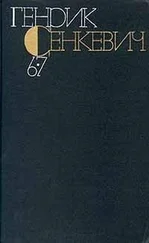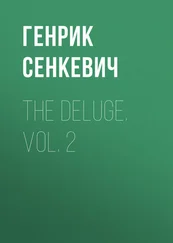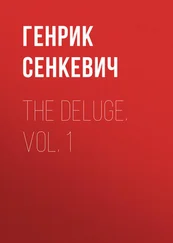Генрик Сенкевич - So Runs the World
Здесь есть возможность читать онлайн «Генрик Сенкевич - So Runs the World» — ознакомительный отрывок электронной книги совершенно бесплатно, а после прочтения отрывка купить полную версию. В некоторых случаях можно слушать аудио, скачать через торрент в формате fb2 и присутствует краткое содержание. Жанр: foreign_antique, foreign_prose, на английском языке. Описание произведения, (предисловие) а так же отзывы посетителей доступны на портале библиотеки ЛибКат.
- Название:So Runs the World
- Автор:
- Жанр:
- Год:неизвестен
- ISBN:нет данных
- Рейтинг книги:5 / 5. Голосов: 1
-
Избранное:Добавить в избранное
- Отзывы:
-
Ваша оценка:
- 100
- 1
- 2
- 3
- 4
- 5
So Runs the World: краткое содержание, описание и аннотация
Предлагаем к чтению аннотацию, описание, краткое содержание или предисловие (зависит от того, что написал сам автор книги «So Runs the World»). Если вы не нашли необходимую информацию о книге — напишите в комментариях, мы постараемся отыскать её.
So Runs the World — читать онлайн ознакомительный отрывок
Ниже представлен текст книги, разбитый по страницам. Система сохранения места последней прочитанной страницы, позволяет с удобством читать онлайн бесплатно книгу «So Runs the World», без необходимости каждый раз заново искать на чём Вы остановились. Поставьте закладку, и сможете в любой момент перейти на страницу, на которой закончили чтение.
Интервал:
Закладка:
At any rate, this tree has one advantage. It is so pretentious, so ridiculous that it takes away from the theory the seriousness which it would have given to less individual minds. We learn from it that from a nervously sick great-grandmother grows a sick family. But the one who would think that her nervousness is seen in descendants as it is in the physical field, in a certain similar way, in some inclination or passion for something, will be greatly mistaken. On the contrary, the marvellous tree produces different kinds of fruit. You can find on it red apples, pears, plums, cherries, and everything you might desire. And all that on account of great-grandmother's nervousness. Is it the same way in nature? We do not know. Zola himself does not have any other proofs than clippings from newspapers, describing different crimes; he preserved these clippings carefully as "human documents," and which he uses according to his fancy.
It can be granted to him, but he must not sell us such fancy for the eternal and immutable laws of nature. Grandmother did have nervousness, her nearest friends were in the habit of searching for remedies against ills not in a drug-store, therefore her male and female descendants are such as they must be – namely, criminals, thieves, fast women, honest people, saints, politicians, good mothers, bankers, farmers, murderers, priests, soldiers, ministers – in a word, everything which in the sphere of the mind, in the sphere of health, in the sphere of wealth and position, in the sphere of profession, can be and are men as well as women in the whole world. One is stupefied voluntarily. What then? And all that on account of grandmother's nervousness? "Yes!" answers the author. But if Adelaïde Fouqué had not had it, her descendants would be good or bad just the same and have the same occupations men and women usually have in this world. "Certainly!" Zola answers; "but Adelaïde Fouqué had nervousness." And further discussion is impossible, because one has to do with a man who his own voluntary fancy takes for a law of nature and his brain cannot be opened with a key furnished by logic. He built a genealogical tree; this tree could have been different – but if it was different, he would sustain that it can be only such as it is – and he would prefer to be killed rather than be convinced that his theory was worthless.
At any rate, it is such a theory that it is not worth while to quarrel about it. A long time ago it was said that Zola had one good thing – his talent; and one bad – his doctrine. If as a consequence of an inherited nervousness one can become a rascal as well as a good man, a Sister of Charity as well as Nana, a farmer boy as well as Achilles – in that case there is an heredity which does not exist. A man can be that which he wishes to be. The field for good will and responsibility is open, and all those moral foundations on which human life is based come out of the fire safely. We could say to the author that there is too much ado about nothing, and finish with him as one finishes with a doctrinarian and count only his talent. But he cares for something else. No matter if his doctrine is empty, he makes from it other deductions. The entire cycle of his books speaks precisely. "No matter what you are, saint or criminal, you are such on the strength of the law of heredity, you are such as you must be, and in that case you have neither merit nor are you guilty." Here is the question of responsibility! But we are not going to discuss it. The philosophy has not yet found the proof of the existence of man, and when cogito ergo sum of Cartesius was not sufficient for it, the question is still open. Even if all centuries of philosophy affirm it or not, the man is intrinsically persuaded that he exists, and no less persuaded that he is responsible for his whole life, which, without any regard to his theories, is based on such persuasion. And then even the science did not decide the question of the whole responsibility. Against authorities one can quote other authorities, against opinions one can bring other opinions, against deductions other deductions. But for Zola such opinion is decided. There is only one grandmother Adelaïde, or grandfather Jacques, on whom everything depends. From that point begins, according to my opinion, the bad influence of the writer, because he not only decides difficult questions to be decided once and forever, but he popularizes them and facilitates the corruption of society. No matter if every thief or every murderer can appeal to a grandmother with nervousness. Courts, notwithstanding the cycle of Rougon-Macquart, will place them behind bars. The evil is not in single cases, but in this, that into the human soul a bad pessimism and depression flows, that the charm of life is destroyed, the hope, the energy, the liking for life, and therefore all effort in the direction of good is shattered.
A quoi bon? Such is the question coming by itself. A book is also an activity, forming human souls. If at least the reader would find in Zola's book the bad and good side of human life in an equal proportion, or at least in such as one can find it in reality! Vain hope! One must climb high in order to get colors from a rainbow or sunset – but everybody has saliva in his mouth and it is easy to paint with it. This naturalist prefers cheap effects more than others do; he prefers mildew to perfumes, la bête humaine to l'âme humaine!
If we could bring an inhabitant of Venus or Mars to the earth and ask him to judge of life on the earth from Zola's novels, he would say most assuredly: "This life is sometimes quite pure, like 'Le Rève,' but in general it is a thing which smells bad, is slippery, moist, dreadful." And even if the theories on which Zola has based his works were, as they are not, acknowledged truths, what a lack of pity to represent life in such a way to the people, who must live just the same! Does he do it in order to ruin, to disgust, to poison every action, to paralyze every energy, to discourage all thinking? In the presence of that, we are even sorry that he has a talent. It would have been better for him, for France, that he had not had it. And one wonders that he is not frightened, that when a fear seizes even those who did not lead to corruption, he alone with such a tranquillity finishes his Rougon-Macquart as if he had strengthened the capacity for life of the French people instead of having destroyed it. How is it possible that he cannot understand that people brought up on such corrupted bread and drinking, such bad water, not only will be unable to resist the storm, but even they will not have an inclination to do so! Musset has written in his time this famous verse: "We had already your German Rhine." Zola brings up his society in such a way that, if everything that he planted would take root, the second of Musset's verses would be: "But to-day we will give you even the Seine." But it is not as bad as that. "La Débâcle" is a remarkable book, notwithstanding all its faults, but the soldiers, who will read it, will be defeated by those who in the night sing: "Glory, Glory, Halleluia!"
I consider Zola's talent as a national misfortune, and I am glad that his times are passing away, that even the most zealous pupils abandon the master who stands alone more and more.
Will humanity remember him in literature? Will his fame pass? We cannot affirm, but we can doubt! In the cycle of Rougon-Macquart there are powerful volumes, as "Germinal" or "La Débâcle." But in general, that which Zola's natural talent made for his immortality was spoiled by a liking for dirty realism and his filthy language. Literature cannot use such expressions of which even peasants are ashamed. The real truth, if the question is about vicious people, can be attained by other means, by probable reproduction of the state of their souls, thoughts, deeds, finally by the run of their conversation, but not by verbal quotation of their swearings and most horrid words. As in the choice of pictures, so in the choice of expression, exist certain measures, pointed at by reason and good taste. Zola overstepped it to such a degree ("La Terre") to which nobody yet dared to approach. Monsters are killed because they are monsters. A book which is the cause of disgust must be abandoned. It is the natural order of things. From old production as of universal literature survive the forgetfulness of the rough productions, destined to excite laughter (Aristophanes, Rabelais, etc.), or lascivious things, but written with an elegance (Boccaccio). Not one book written in order to excite nausea outlived. Zola, for the sake of the renown caused by his works, for the sake of the scandal produced by every one of his volumes, killed his future. On account of that happened a strange thing: it happened that he, a man writing according to a conceived plan, writing with deliberation, cold and possessing his subjects as very few writers are, created good things only when he had the least opportunity to realize his plans, doctrines, means, – in a word, when he dominated the subject the least and was dominated by the subject most.
Читать дальшеИнтервал:
Закладка:
Похожие книги на «So Runs the World»
Представляем Вашему вниманию похожие книги на «So Runs the World» списком для выбора. Мы отобрали схожую по названию и смыслу литературу в надежде предоставить читателям больше вариантов отыскать новые, интересные, ещё непрочитанные произведения.
Обсуждение, отзывы о книге «So Runs the World» и просто собственные мнения читателей. Оставьте ваши комментарии, напишите, что Вы думаете о произведении, его смысле или главных героях. Укажите что конкретно понравилось, а что нет, и почему Вы так считаете.












